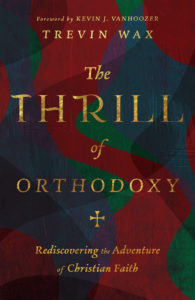
This I Believe
The Christian life begins with spiritual astonishment at the glory of the gospel and the goodness and beauty of Christian truth, with the wide-eyed surprise of the infant brought into a new world of grace.  But over time, our eyes grow heavy and our tastebuds dim—and that’s when errors creep in. Spiritual sleepiness results in a sagging sense of God’s love and diminished commitment to pass on the faith to the next generation. We become sluggish with the Scriptures; bored with the Bible; drowsy toward doctrine. Overfamiliar with the truth, we gravitate toward “exciting” new teachings or practices that promise to awaken us from spiritual slumber. And error—always dressing itself up as more attractive than truth—seizes opportunity when we are most prone to wander.
But over time, our eyes grow heavy and our tastebuds dim—and that’s when errors creep in. Spiritual sleepiness results in a sagging sense of God’s love and diminished commitment to pass on the faith to the next generation. We become sluggish with the Scriptures; bored with the Bible; drowsy toward doctrine. Overfamiliar with the truth, we gravitate toward “exciting” new teachings or practices that promise to awaken us from spiritual slumber. And error—always dressing itself up as more attractive than truth—seizes opportunity when we are most prone to wander.
Why do we so easily lose our wonder at truths that have informed and inspired Christians for generations? How is it we find ourselves no longer wowed by old truths? Why are we drawn toward theological error? To better understand our susceptibility to this spiritual malaise, we should take a closer look at our context, to see the forces at work—in our world, in our churches, and in us—that diminish our devotion.
Cultural Chaos
We begin with the anxiety and unsettledness of these chaotic times, a result of political polarization, technological advances, and worldwide disasters. We are inundated by information (and disinformation), flooded by various views and opinions ranging from the absurd to the abstract, which make it difficult to discover what sources are credible. Anyone can grab a megaphone and shout down those who would deviate even slightly from whatever new orthodoxy unites a particular community or political party. We don’t know who, if anyone, we can trust.Why do we so easily lose our wonder at truths that have informed and inspired Christians for generations? Click To Tweet
For Christians, this sense of disorientation is magnified by the shifting moral landscape. No longer can we expect religiosity to be respectable. Long-held beliefs and values drawn from Christian doctrine are now “extreme.” Assumptions shared by nearly everyone a few decades ago are suddenly beyond the pale. As fewer and fewer people identify with a religious tradition, those who adhere today to institutional forms of religion fall further outside the mainstream.
In generations past, respectable religiosity and cultural Christianity presented their own set of challenges to true faith and practice. The way of Christ is never easy, and believers in every era are prone to forget their first love (Revelation 2:4). In our era, the danger of abandoning our first love manifests itself through the pressures of a society where Christianity is not the norm, and common Christian beliefs and morals no longer seem plausible. In the midst of constant flux, “stability” is now regarded with suspicion. Like everything else, faith is caught up in the whirlwind of change.
Church Confusion
Meanwhile, many churches are in a stupor—bewilderment drains the energy of the believers who attend. Congregations and denominations are embroiled in conflicts that resemble the world of hardball politics. In our era, the danger of abandoning our first love manifests itself through the pressures of a society where Christianity is not the norm, and common Christian beliefs and morals no longer seem plausible. Click To TweetWidespread disillusionment has settled into the church following the scourge of sex abuse scandals, abusive leadership patterns, and institutional coverups of atrocities committed by some of the world’s most trusted and admired faith leaders.
Hypocrisy has bolstered the anti-institutional sentiments of many toward the church, leading to an explosion of new religious options and narrowly tailored spiritual experiences. Cultural observer Tara Isabella Burton says many people are trading institutional religion for intuitional spirituality: “a religion decoupled from institutions, from creeds, from metaphysical truth-claims about God or the universe . . . but that still seeks—in various and varying ways—to provide us with the pillars of what religion always has: meaning, purpose, community, ritual.”
In response to this crippling confusion, some Christians call for the updating and improvement of the faith for a modern era. Others disavow aspects of historic Christianity but try to hold on to a few preferable parts. Several high-profile leaders have renounced the faith altogether. Meanwhile, large swaths of once-faithful churchgoers have quietly closed the door and just slipped away.
Christian Complacency
What happens to those who are left, the rank-and-file Christians who love their families and cherish their churches? In every generation, we face the danger of longing for the past while fearing the future. And this mix of nostalgia and fear leads us into a state of complacency—a mission-less faith. We file in and out of the sanctuary week after week, content to recite the same words with our lips, but our hearts remain unstirred by the truths we confess, and we are less likely to invite others to believe the good news.Complacent Christianity causes compartmentalization—a convenient separation of Christian truth from the beliefs that frame our day-to-day activities. Click To Tweet
Complacent Christianity causes compartmentalization—a convenient separation of Christian truth from the beliefs that frame our day-to-day activities.
Christianity becomes just one aspect of a busy life. What we believe, we’re told, isn’t as important as how we live. And even then, it’s fine if our life choices don’t line up with Christian teaching as long as our faith helps us be true to ourselves and keeps us from hurting anyone.
What’s missing from this scenario is any sense of Christianity as a mission that requires obedience to a King, a rollicking adventure that brings us face to face with opposition, as we proclaim something bigger and more satisfying than personal preference. Christianity’s call to costly obedience may not appear on the surface as heroic or radical—we may experience seasons of stress as we struggle to raise our kids, clock in and out of an unfulfilling job, and do our best to serve the believers in a church filled with problems—but we must remember that the pathway of repentance and faith imbues even the smallest acts of self-sacrifice with eternal significance. The mission remains, and it stands in contrast to a complacent Christianity that would domesticate the faith and dampen its revolutionary passion. In countless ways that may not seem obvious to us or others, we are to rebel against the rebellion of a fallen world and witness to the rule of the risen Jesus over the universe.
The Diagnosis
I’m convinced that one of the primary causes of this spiritual malaise is our loss of confidence in the truth and goodness of the Christian faith. In every generation, we risk losing our wonder at the glory of Christian truth and the enduring witness of the church. Amid chaos and confusion, we can easily turn our focus on ourselves and, as a result, forget God. It’s as if we have inherited a vast estate—sprawling grounds surrounding beautiful buildings filled with priceless heirlooms—but we stay cooped up in a broom closet, complacent and bored, with no desire to explore all that we’ve been given in Christ.The key to renewal is to return to the only truth that is reliable and sturdy when so much in the world seems fleeting and faddish: the gospel of God delivered once for all to the saints. Click To Tweet
We’ve been here before. Chaos and confusion are not new. Every generation faces these challenges, for different reasons. The key to renewal is not to do away with the aspects of Christianity we find unsettling in our time. (After all, if Christianity is true, we ought to expect every culture to come into conflict with its claims at some point or another.) Neither should we ignore new challenges and wave away hard questions about what we believe and why.
No, the key to renewal is to return to the only truth that is reliable and sturdy when so much in the world seems fleeting and faddish: the gospel of God delivered once for all to the saints. The gospel is the royal announcement that Jesus Christ, the Son of God, lived a perfect life in our place, died a substitutionary death on the cross for our sins, rose triumphantly from the grave to launch God’s new creation, and is now exalted as King of the world. This announcement calls for a response: repentance (mourning over and turning from our sin, trading our agendas for the kingdom agenda of Jesus Christ) and faith (trusting in Christ alone for salvation by the power of the Spirit). Much more can and must be said about this good news and its impact on us and on the world. I’ve merely scratched the surface of what J. I. Packer used to tell his students is “the biggest thing that ever was”; ancient truth, ever new. The way forward is to reach back, to find renewal in something old—foundational truths tested by time, a fount of goodness that refreshes and satisfies, long-forgotten beauty from the past that lifts our eyes above the suffering and sorrow of the present.
The Thrill of Orthodoxy
What the church needs today is to recapture the thrill of orthodoxy.What the church needs today is to recapture the thrill of orthodoxy. Click To Tweet
We need the “old, old story” of “how a Savior came from glory.” We need to be part of a courageous choir of Christians—reawakened to the beauty and majesty of the Christian melody, committed to right belief and right worship. To join our voices with the apostles of two thousand years ago, singing the one song that by the power of the Spirit still resonates today.

